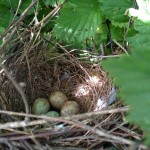
Birds of a Feather
My father brought me a cake of suet for Thanksgiving. He’d made it himself, a simple concoction of peanut butter, cornmeal, shortening, and flour. It hangs inside a square wire cage on a pole outside my kitchen window where I watch the birds feast as I wash the dishes.
I learned to take care of the birds from my grandfather, whom I stayed with one summer as a teenager. He took me with him as he strolled around his yard, refilling the various feeders: thistle for the goldfinches, sunflower seeds for the cardinals, jays, and chickadees, and a fruit and mealworm mixture for the woodpeckers and bluebirds. He would patiently mix sugar into warm water for the hummingbirds, and we’d watch them as they flitted and hovered by the sweet juice, their long tongues darting from their needle-like beaks as they drank.
In between doing chores for my grandmother and growing restless after idle hours spent reading, I’d head outside to find my grandfather dozing in the shade, a beer in one hand and a smoldering cigarette in the other. We would while away the afternoon as he taught me to notice the bird songs. I learned to focus and distill one from another, to cut out the background noise of neighbors mowing the lawn and dogs barking down the street. Although I couldn’t always see them, their songs gave them away. The high-pitched chip, chip, chip of the cardinal, the trill of the mockingbirds, the coarse clarion of the blue jays.
In the dusk of the evening, when the light grew too dim to distinguish their colors, he showed me how to recognize each type by its flight pattern, the distinctive swoop and dive of the mockingbird, the short scalloped lift and drop of the cardinal, or the gentle downward flutter of the mourning dove. Once, from the woods that lined the yard’s edge, we heard the muffled staccato hoo-hoo-hoo-HOO of a barn owl and seconds later watched as his shadow fell over the trees and everything in the woods fell silent.
My grandmother’s approach to the birds seemed less philosophical and more focused on portion control. Several trash cans full of seed lined their garage wall, but it was to be doled out only to the colorful songbirds. She hated the greedy purplish black starlings that descended in large flocks and scared away the less aggressive species. She’d sneer in contempt at their shameless effrontery, the feathered one-percenters. Worst of all were the persistent seed-grubbing squirrels. She worked herself into a tizzy, rapping on the kitchen window and yelling at them to scat as they robbed the feeders bare.
A friend of mine once had a brilliant African Gray parrot, which can have the average intelligence of a five-year-old child. Each morning, she’d pull back the shower curtain after her shower and open his cage door, saying, “Are you coming out of there, or what?” One morning, she apparently took a second longer toweling off before opening her curtain, and she heard his impatient voice ask, “Are you coming out of there, or what?” She stowed him under her seat on a flight once, and every time the captain came over the loudspeaker, the parrot would call out, “What?! What?!” causing fellow passengers to cast rude looks at her. The noise and speed of take off excited him so much he yelled at the top of his lungs, “Wowee! Wowee!!” before settling down once they were at cruising altitude, whereupon he sang the entire theme song to Green Acres. He was a rock star.
A bird like that with high intelligence and speech unnerves me; I imagine they must be plotting something. Plus, with the cats that already live here, there would be a constant rehash of all the Sylvester and Tweety episodes ever made, so we consequently never had a caged bird in residence. I am content to enjoy them from a distance, filling my own backyard feeders and setting up houses on fence posts.
Birds are everywhere–city parks, private gardens, forests, wetlands, rooftops, and windowsills. We are essentially surrounded by these wild animals and see them every day, but unless we live in Alaska and own a small dog that would make a delightful morsel for an eagle, we don’t fear them. About as different from us as a species can be, they are untethered to the land, minstrels in the trees, and give birth to eggs. Their bones are hollow and all but weightless, their abdomens are filled with air sacs, and their bodies are coated with soft colorful feathers.
 Despite or perhaps because of their differences, birds have been teaching me my whole life. My own backyard is a classroom.
Despite or perhaps because of their differences, birds have been teaching me my whole life. My own backyard is a classroom.
1. Create: Feather your nest. Look around and try to make even the mundane things beautiful. Use horse hair, Easter grass, or Christmas tinsel, but add some sparkle.
2. Have some common sense: My father told us about raising turkeys on their Wisconsin farm. Each year, several would drown because they’d stand out in the rain and look up.
3. Appreciate even small glimpses of beauty: In the woods around my parents’ house, we would often hear the elusive scarlet tanager singing, but it perched so high we rarely saw its blazing color. One of my mother’s greatest delights was spotting that unicorn every now and then.
4. Let loose every once in a while: During a hot, dry summer, after I water the azaleas outside my window, the birds congregate around the puddles and splash with abandon. Dance like no one’s watching.
5. Don’t get in fights you can’t win: Every spring, there’s a persistent cardinal who attacks his own reflection in the side mirror on my husband’s truck. This posturing and bravado goes on for days. The bird in the mirror never backs down.
6. Don’t worry: The sermon on the mount gets to the heart of the matter: look at the birds of the air; they do not sow or reap or store away in barns, and yet your heavenly Father feeds them. Who of you by worrying can add a single hour to his life?
7. Soar: Even though we’re grounded earthlings, we can still soar. Look up! Go for it! Take that leap of faith! You have to leave the safety of the nest sometime–it gets crowded in there.
8. Take care of the eggs: Give the littles all they need. Sit on them if necessary. Eventually, they will try their wings and figure out how to fly. (See #6).
9. When the cage door is open, fly: Don’t just sit there in bondage with your shiny mirrors and familiar perch! Are you coming out of there, or what?
